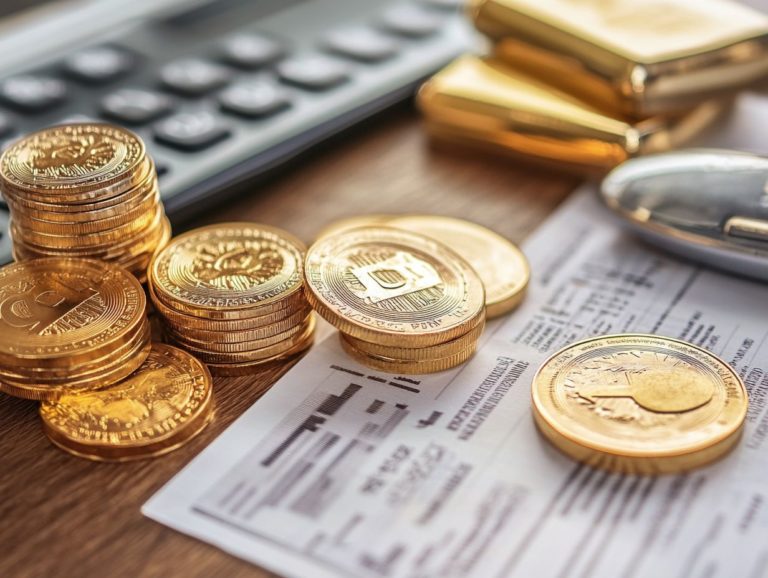Best Practices for Tax Reporting in Precious Metals
Navigating the world of precious metals is an experience that can be both exhilarating and intricate, particularly when it comes to tax reporting. With an array of metals—such as gold, silver, and platinum—each presenting distinct tax implications, understanding your obligations becomes essential.
This guide provides key tax reporting requirements, sheds light on common pitfalls to avoid, and outlines best practices for meticulous record-keeping.
Whether you are a seasoned investor or just starting your journey, this information will empower you to remain compliant while maximizing your investments!
Contents
- Key Takeaways:
- Types of Precious Metals and Their Tax Implications
- Tax Reporting Requirements for Precious Metals
- Common Mistakes to Avoid in Precious Metals Tax Reporting
- Best Practices for Accurate Tax Reporting
- Frequently Asked Questions
- What are the best practices for tax reporting in precious metals?
- Do I have to pay taxes on my precious metals investments?
- Are there any special tax rules for selling or exchanging precious metals?
- What records should I keep for tax reporting in precious metals?
- Can I deduct losses from my precious metals investments on my taxes?
- How can a tax professional help with my precious metals tax reporting?
Key Takeaways:
- Keep accurate records of precious metals transactions to avoid penalties.
- Understand the different types of precious metals and their specific tax implications.
- Talk to a tax expert for help with tax reporting requirements.
Why Tax Reporting is Important for Precious Metals
Tax reporting is a pivotal aspect of managing your investments in precious metals, such as physical gold and silver, as well as other valuable assets like platinum and palladium.
Understanding the details of tax obligations can significantly impact your investment returns. For instance, knowing about capital gains tax—the tax paid on profits from selling an asset—is essential. You must accurately report profits from your sales; overlooking this can result in substantial penalties. Exploring loss carryforward options may offer financial relief if you encounter market downturns, enabling you to offset future gains.
Diligent record-keeping is essential, as maintaining comprehensive documentation will streamline the reporting process and protect you against potential audits.
By prioritizing tax awareness and compliance, you can optimize your gains while ensuring that your portfolio stays within the boundaries of IRS regulations.
Types of Precious Metals and Their Tax Implications
When contemplating investments in precious metals, it’s essential to grasp the various types available and their respective tax implications, as different metals can lead to differing tax liabilities.
Investments in gold, silver, platinum, and palladium each come with unique tax regulations, which can substantially influence your investment portfolio.
For example, while gold is often seen as a hedge against inflation, the tax treatment of gains from its sale may vary significantly compared to those associated with silver or platinum. Recognizing these distinctions will enable you to make informed decisions regarding your holdings and the tax obligations that accompany them.
Gold, Silver, Platinum, and Other Metals
Gold, silver, platinum, and palladium stand out as key players in the realm of precious metals, each presenting unique advantages and tax implications for your portfolio.
Gold captivates many not just for its historical role as a safe haven during economic turmoil but also for its relatively stable market trends that serve as a hedge against inflation. On the other hand, silver functions as both an investment and an industrial commodity. Its prices fluctuate based on technological demand, especially in the realms of electronics and solar energy.
Platinum and palladium are rarer and highly sought after in the automotive industry, showcasing notable price volatility shaped by production rates and regulatory shifts. The various forms these metals take—bars, coins, or bullion—also influence their tax treatment and potential capital gains.
To make the most of your investments, you’ll need to navigate these complexities and tailor your tax strategies while making well-informed decisions in the precious metals market.
Tax Reporting Requirements for Precious Metals
Understanding tax reporting requirements for precious metals is vital for you as an investor. This knowledge ensures compliance with the IRS and allows for accurate declaration of any gains or losses.
For instance, the Internal Revenue Service requires that any sale of precious metals be reported using Form 1040 and Form 1099-B. This highlights the importance of meticulous record-keeping and precise reporting.
Value fluctuations of precious metals can affect your overall tax liability. Therefore, familiarize yourself with the necessary forms and deadlines to avoid financial penalties and enhance your investment outcomes.
Forms and Deadlines
Understanding the various forms and deadlines for tax reporting is crucial. The IRS mandates that any sales be reported using specific forms, including Form 1040 and Form 1099-B. These must be submitted by certain deadlines to avoid late fees and penalties.
Keep track of these deadlines, especially if you’re involved in multiple transactions. This ensures that all tax implications are documented and reported accurately.
Accurate reporting helps you maintain compliance and supports your tax strategy. Be aware of quarterly deadlines for estimated tax payments and annual submissions. These can significantly impact your cash flow management and future investment decisions.
Learning about these forms can also reveal potential deductions or credits that may benefit you. Recognizing and respecting these deadlines minimizes your audit risk and helps you maintain good standing with the IRS, paving the way for better financial health.
Common Mistakes to Avoid in Precious Metals Tax Reporting
Avoiding common mistakes in tax reporting is essential. Errors can range from inadequate documentation of transactions to miscalculating the cost basis, which is the original value of your investments. These mistakes can impact your capital gains tax assessments.
It’s easy to overlook the specific IRS rules concerning collectibles tax, potentially leading to unexpected tax liabilities. Identifying and addressing these pitfalls can safeguard your wealth and ensure accurate reporting.
Penalties and Consequences
The penalties tied to improper tax reporting can be severe. They can impact both your financial standing and your investment strategy. The IRS enforces strict penalties for failing to report capital gains accurately or underreporting income from precious metals sales. This can lead to increased tax liabilities and financial repercussions.
Repeat offenses may escalate into serious issues, including audits and substantial fines. Be aware of these potential consequences to protect your investments and ensure compliance with tax laws.
Improper tax reporting can disrupt your long-term investment goals. Unexpected tax liabilities may strain your cash flow, making it challenging to reinvest or diversify your portfolio. The threat of audits can elevate stress, diverting your focus from critical investment decisions. Compliance isn’t just about avoiding penalties; it’s about creating a stable financial environment for your investments to flourish.
Being proactive about tax reporting ensures that your investment strategy remains robust in the face of ever-evolving regulations.
Best Practices for Accurate Tax Reporting
Implementing best practices for accurate tax reporting is essential for investors in precious metals. This ensures compliance and optimizes financial outcomes.
By maintaining detailed records of all transactions—including purchases, sales, and associated costs—you establish a clear cost basis. This simplifies the calculation of capital gains tax. Understanding the available tax deductions can significantly minimize your overall tax liability.
By following these best practices, you can streamline your tax reporting process and reduce the risk of potential errors.
Tips for Keeping Accurate Records
Keeping accurate records is crucial for effective tax reporting on precious metals. This allows you to track your investment decisions while ensuring compliance with IRS regulations.
This careful approach fosters transparency and enables informed decisions throughout your investment journey. Focus on recording various documents, such as purchase receipts, invoices, storage costs, and any fees that could impact your overall investment value.
Utilize tools like spreadsheets, dedicated financial software, or mobile apps designed for easy data input and retrieval. This streamlines your tracking process. By adopting these practices, you minimize the risk of errors, leading to a smoother tax filing experience and better adherence to tax obligations.
Working with a Tax Professional
Partnering with a tax professional offers invaluable guidance as you navigate the complexities of tax reporting for precious metals. These experts understand IRS regulations and help you maneuver through capital gains tax, collectibles tax, and other implications of your investments.
Their expertise demystifies intricate laws and pinpoints potential deductions that might otherwise slip under your radar. This partnership keeps you ahead of the game with the latest tax codes, enabling strategic planning for future acquisitions.
By ensuring compliance and leveraging insights into effective tax strategies, this relationship significantly alleviates the stress of tax season. The right professional can provide customized advice on the optimal timing for selling your precious metals, helping you maximize returns while minimizing your tax burden.
Frequently Asked Questions
What are the best practices for tax reporting in precious metals?
The best practices for tax reporting in precious metals include keeping accurate records of all transactions, reporting gains and losses on Schedule D of your tax return, and consulting with a tax professional for guidance.
Do I have to pay taxes on my precious metals investments?
Yes, you typically owe taxes on gains from buying and selling precious metals. However, certain exceptions and exemptions may apply, so it’s important to consult with a tax professional for personalized advice.
Are there any special tax rules for selling or exchanging precious metals?
Yes, unique tax rules exist for selling or exchanging precious metals. You must report gains or losses on Schedule D of your tax return and be aware of wash sale rules that prevent claiming a tax deduction on a loss if you buy the same asset within 30 days. Consulting with a tax professional is essential for guidance on your specific situation.
What records should I keep for tax reporting in precious metals?
It’s vital to keep accurate records of all purchases, sales, and exchanges of precious metals, including the date, amount, and cost basis. Keep these records to help you accurately report gains and losses, as they may be requested by the IRS in case of an audit.
Can I deduct losses from my precious metals investments on my taxes?
Yes, you can deduct losses from your precious metals investments. This helps reduce gains from other investments.
If your losses exceed your gains, you can deduct up to $3,000 on your tax return. Any remaining losses can be carried over to future years.
How can a tax professional help with my precious metals tax reporting?
A tax professional provides personalized guidance for reporting your precious metals investments. This minimizes your taxes and helps you avoid penalties or mistakes.
They keep you informed about changes in tax laws that may affect your investments. Don’t miss out on potential savings—consult a tax professional today!



















